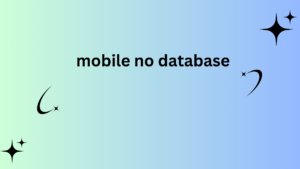And then you also have to think about what
Posted: Sat Dec 21, 2024 4:41 am
But you can also do giveaways. So if you participate in survey, you're entered to win X Prize and you kind of spread the cost out and you can give away something really, really exciting and get a lot of people to participate in the survey and end up if the numbers work out, it can actually be more cost effective to do it that way.
things you don't want to do when you're running a survey. And I think you don't want to ask people questions of what they would or will do. Like, you want to ask questions that touch more on things that people have done, because the reason is you're not going to get reliable answers. And asking, for example, if you ask someone mobile no database whether they will buy a product or not, versus have they actually bought something similar is a completely different kind of question to ask for that first one. If you're asking something, if you're asking someone if they will do something in the future, it's not a reliable answer, right? You don't know what they're actually thinking versus asking people what they've done in the past, how they've come to conclusions, what they have planned in the past and really just not asking tons of open ended questions. Multiple choice, usually far better in terms of getting actionable data.

CAROLINE: I love your point of not asking where you do this in the future, because especially if it's kind of phrase away. Like, will you? I don't know. Oh, yes, of course I'm gonna do this right. Of course. But have you done it ever in your life? Oh, no, I didn't. You know, if you ask something that is like, oh, yeah. Like, potentially, I can bring me improvement that can help my life. Of course, I will do it. But this is not like this is not real.
TYREL: And also, and you can ask a question. Have you used a landing page builder? Yes or no? And if they say yes or you can even say it more specifically, have you used a landing page product or have you paid for a landing page product in the past twelve months, we kind of narrow down the focus. And if they say yes, then it's a logic tree question where you followed that up with? Okay. How did you find what method did you use to find that product where you hit with a paid ad? Did you find it through a blog? Did you find it through an influencer? Like, how did you find it? You could ask questions like, what did you pay for it? Because you've already qualified that. Yes, they have purchased a product.
CAROLINE: Yeah, they are in your target market.
TYREL: Definitely. And I think that's my experience with the Google survey product is you do these filtering questions? I think there are ways to set up multiple filtering questions before the person actually takes the survey, which is really interesting, because then you're not paying for those survey completions.
things you don't want to do when you're running a survey. And I think you don't want to ask people questions of what they would or will do. Like, you want to ask questions that touch more on things that people have done, because the reason is you're not going to get reliable answers. And asking, for example, if you ask someone mobile no database whether they will buy a product or not, versus have they actually bought something similar is a completely different kind of question to ask for that first one. If you're asking something, if you're asking someone if they will do something in the future, it's not a reliable answer, right? You don't know what they're actually thinking versus asking people what they've done in the past, how they've come to conclusions, what they have planned in the past and really just not asking tons of open ended questions. Multiple choice, usually far better in terms of getting actionable data.

CAROLINE: I love your point of not asking where you do this in the future, because especially if it's kind of phrase away. Like, will you? I don't know. Oh, yes, of course I'm gonna do this right. Of course. But have you done it ever in your life? Oh, no, I didn't. You know, if you ask something that is like, oh, yeah. Like, potentially, I can bring me improvement that can help my life. Of course, I will do it. But this is not like this is not real.
TYREL: And also, and you can ask a question. Have you used a landing page builder? Yes or no? And if they say yes or you can even say it more specifically, have you used a landing page product or have you paid for a landing page product in the past twelve months, we kind of narrow down the focus. And if they say yes, then it's a logic tree question where you followed that up with? Okay. How did you find what method did you use to find that product where you hit with a paid ad? Did you find it through a blog? Did you find it through an influencer? Like, how did you find it? You could ask questions like, what did you pay for it? Because you've already qualified that. Yes, they have purchased a product.
CAROLINE: Yeah, they are in your target market.
TYREL: Definitely. And I think that's my experience with the Google survey product is you do these filtering questions? I think there are ways to set up multiple filtering questions before the person actually takes the survey, which is really interesting, because then you're not paying for those survey completions.